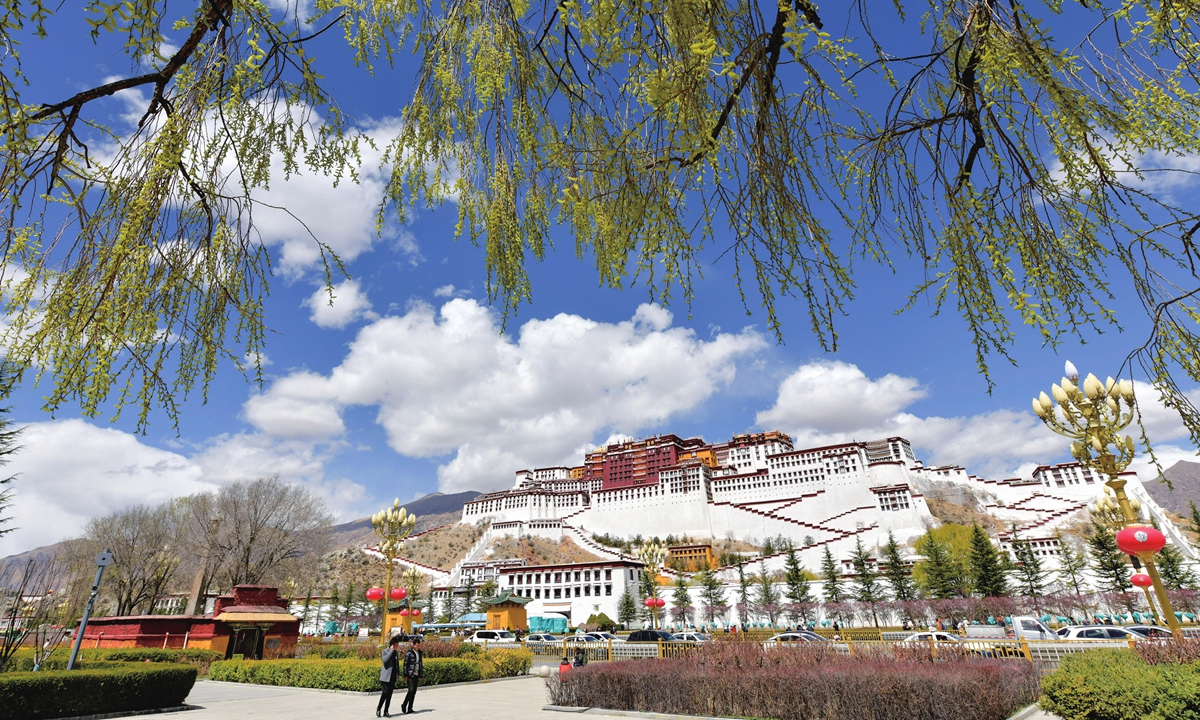
On March 23, 2024, as temperatures warmed up, spring was in full swing in Lhasa, with willow trees sprouting green at the foot of the Potala Palace. Photo: VCG
I consider myself to be very lucky to have the opportunity to visit Xizang and what I saw surprised me. The trip recently was arranged by the Information Office of the Xizang Autonomous Region.
After almost 20 years living, working and travelling inside China, this was the first opportunity I'd had to visit Xizang. Of the 30 or more personalities, social media influencers and delegates on the tour, I was the only foreigner.
Individuals telling the truth about China, come up against millions of US dollars invested in pursuing anti-China negativity. The old adage of repeating a lie until it's believed to be true is hugely apparent when reading about China. Xizang is quite different to what they tell us in the West.
I prefer to keep my online opinions to facts based on my travels and my experiences over the last 20 years, so I chose not write about Xizang. My traveling experiences include cycling over 45,000 kilometers and I met literally thousands of ordinary people in ordinary places. It's very hard to call me a liar when I produce evidence to support my opinions, although some still do; even more when it comes to Xizang.
They call me a liar because I was with the government and only saw what the government wanted me to see. But the government didn't stop me looking out the bus window, nor did they stop me going for long walks into downtown Lhasa, or downtown Linzhi. They didn't stop me interacting, and even dancing, with thousands of people in a village fair in Maizhokunggar.
Oppression exists in many places, I've seen it, and I even helped deliver it as a police officer in the UK, fighting miners who wanted a better life, fighting colored migrants who wanted equality, fighting white supremacists who want their country back. I was one of Margaret Thatcher's thin blue line, keeping "ordinary" people safe from those that in today's world would labeled extremists.
I know what oppression looks like and here's the thing, after extensive travel in China, I've never seen it anywhere. I didn't see it in Xinjiang and I certainly didn't see it in Xizang.
I saw kids who speak, read and write their local language. I saw adults dressed in their local styles. I saw ordinary people shopping, visiting temples and serving food in the streets and in restaurants.
I saw shops selling Tibetan-style clothes that were not just for tourists, I read menus and street signs in the local language, I met with a musician who specializes in local music and I met with professors working on rewriting and preserving ancient scripts.
I met the dean of a Tibetan Buddhist university and I walked through the most incredible temples I've seen in my life.
I visited a village of homes which were all at least twice the size of my own apartment with beautiful gardens.
The people decorated them at their own cost but the government provided them free in order to ensure these people weren't living a tough, subsistence lifestyle in a hostile environment with none of the trappings of modernity.
I spoke with a man who never went to university but his son is currently studying at university. When he was a child, it took two weeks to travel to school, so only came home once a year. His son went to school each term on a bus which took two hours across a mountain pass.
I visited an old people's home where anyone can go for a day, get a meal, play games, use the gym, get a medical check-up and chat with their friends in whichever language they choose. I travelled on highways that were fast and comfortable. I saw the high-speed train racing into the region and out again. I flew into Lhasa and flew out of Linzhi, both modern comfortable and secure airports.
In short, I saw a region with a lot of people living normal lives. I don't know what their day-to-day problems might be, but I do know they aren't oppressed. Why do people reading media emanating from Washington DC believe that they are?
The author is a British Australian freelance writer who has studied cross cultural change management in China and has lived in the country, traveling extensively for almost two decades. opinion@globaltimes.com.cn




